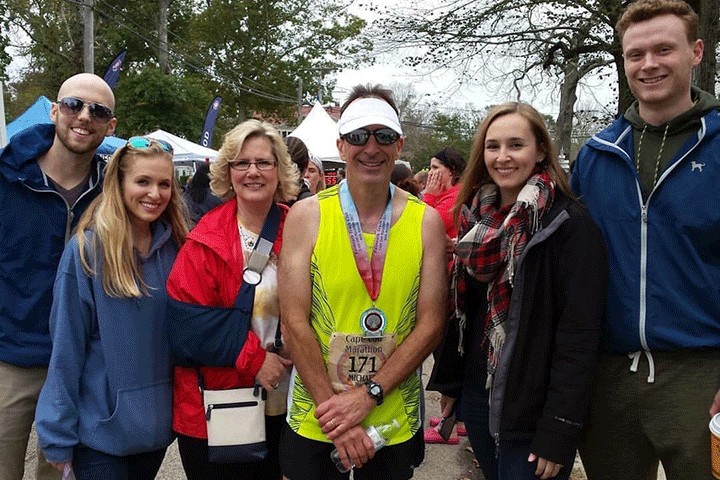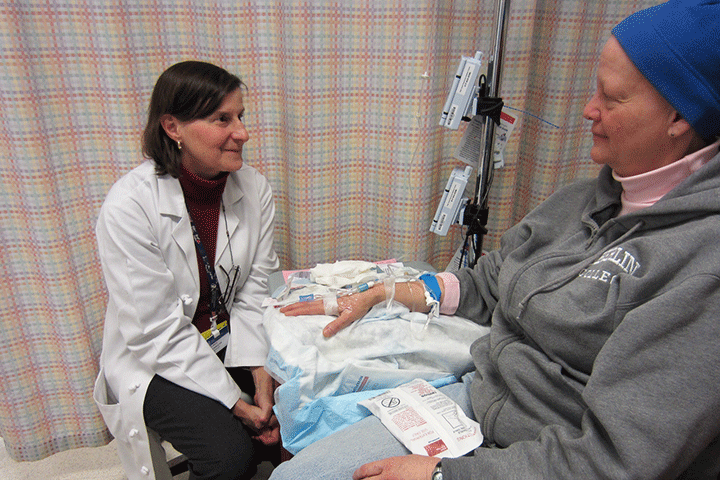Complementary Therapies—a Way to Gain Peace?

Lora Thompson, Ph.D.
When you are diagnosed with pancreatic cancer, battling the disease is only one part of the equation.
You must also navigate the often debilitating side effects of treatment and the fallout from your constantly shifting emotional state. Your normal routines—the foods you like, regular activities, including exercise—may fall by the wayside. You may not even want to eat due to nausea from the chemotherapy.
To counteract the biological and psychological stresses, a growing number of cancer patients are turning to complementary therapies alongside conventional medical strategies while they battle the disease. According to a 2012 National Health Interview Survey, cancer survivors are more likely to use complementary therapies than adults who have never been diagnosed with cancer.
The Value of Complementary Therapies
The stress of a cancer diagnosis and its treatment can activate the “fight or flight response” and potentially worsen symptoms including insomnia, muscle tension, pain, and mood disturbances. While you can’t rely on complementary therapies to beat pancreatic cancer, such therapies can dramatically improve quality of life and may even impact survival when used in conjunction with conventional medicine. And while there has not yet been scientific proof of the efficacy of these alternatives, their popularity is a signal that patients feel they are gaining peace of mind—and stress relief.
“Research suggests that levels of psychological distress are higher in pancreatic cancer patients than many other groups of cancer patients,” says Lora Thompson, Ph.D., Director of Integrative Medicine Service at Moffitt Cancer Center, Tampa, Florida. “Using complementary therapies may help them to feel as if they are doing something more to manage their cancer and treatment side effects.”
Most Popular Complementary Therapies
Here are six complementary strategies that are gaining popularity among pancreatic cancer patients:
- Acupuncture. An integral part of Chinese medicine, acupuncture is based on the idea that energy flows through invisible pathways called meridians. During a treatment, the acupuncturist stimulates certain areas along these meridians with needles, helping direct the flow of energy. While acupuncture may not target pancreas cancer directly, studies show it reduces stress, anxiety, and depression to the same degree as some pharmaceuticals, and improves optimism to boot. At the very least, patients report feeling better, and that may help counteract some of the fatigue associated with treatment.
- Nutrition. Diet is essential for building strength while battling disease. Patients with pancreatic cancer are at particular nutritional risk. “Up to 20 percent of patients die from the effects of malnutrition rather than the cancer itself,” says Pamela Hodul, M.D., Medical Director of the Nutrition Support Team in the Department of Gastrointestinal Oncology at Moffitt. Patients with pancreatic cancer develop anorexia, and then they have increased fatigue because they’re not getting enough calories. Instead of loading up on mega-doses of vitamins or supplements to fill the gaps, getting nutrients from food is always best—whether you’re healthy or not —since our bodies can regulate how much our cells absorb. “Even things like multivitamins can actually decrease the effects of chemotherapy so you have to be careful,” says Hodul.
- Meditation. Meditation involves focusing your mind to calm your body. It allows you to be aware of the sensations of pain, and even make space for it, without becoming overwhelmed by it. Studies show the practice helps alleviate anxiety, depression, and stress while simultaneously enhancing immune function. “The idea is to accept the negative emotions that are part of the cancer experience but also find a way to still have positive experiences during such a difficult time in their lives,” says Thompson.
- Guided Imagery. Imagine sucking on a very tart, juicy lemon. You probably started to salivate, right? That’s the mind and body at work together. If you can make your body salivate with your mind, it’s not unreasonable to think you can manage your stress levels the same way. During guided imagery, a trained therapist (or audio recording) guides you through a visualization exercise to produce physiological changes in the body. You might imagine a place that you love or mentally rehearse a desired outcome—like beating cancer.
- Massage. For some patients, massage can be a calming and relaxing way to achieve some peace. It may even help reduce pain and alleviate anxiety. The caveat: search for a massage therapist who has experience with cancer patients and make sure he/she steers clear of the area around the cancer site or near enlarged lymph nodes. You should also avoid deep tissue massage if you have advanced cancer.
- Yoga, Tai Chi, and Qigong. These ancient movement practices help calm the nervous system while balancing hormones and metabolism—both of which become irregular under chronic stress. Each style also teaches you to breathe more deeply and stay present in the moment.
“Techniques such as meditation, guided imagery, and music or art therapy are good for the mind, body, and spirit, and they help patients cope,” says Hodul. “The bottom line is: You really have to support your body so it can best fight the disease.”






